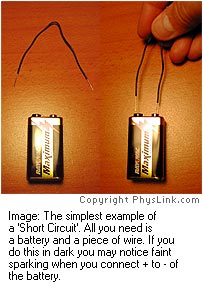Fan Micro Car DIY STEM Kit
$9.99$5.95
 A short circuit is simply a low resistance connection between the two conductors supplying electrical power to any circuit. This results in excessive current flow in the power source through the 'short,' and may even cause the power source to be destroyed. If a fuse is in the supply circuit, it will do its job and blow out, opening the circuit and stopping the current flow.
A short circuit is simply a low resistance connection between the two conductors supplying electrical power to any circuit. This results in excessive current flow in the power source through the 'short,' and may even cause the power source to be destroyed. If a fuse is in the supply circuit, it will do its job and blow out, opening the circuit and stopping the current flow.
 'Natural science does not simply describe and explain nature, it is part of the interplay between nature and ourselves.'
'Natural science does not simply describe and explain nature, it is part of the interplay between nature and ourselves.'